unit 1 新编实用英语综合教程
- 格式:doc
- 大小:91.50 KB
- 文档页数:14

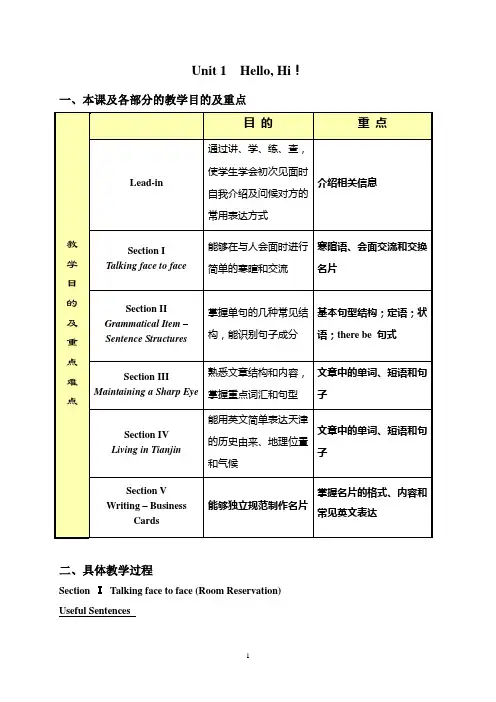
Unit 1 Hello, Hi!一、本课及各部分的教学目的及重点二、具体教学过程Section ⅠTalking face to face (Room Reservation) Useful Sentences(该环节首先播放教学视频,使学生对寒暄和交流过程有直接的认识。
然后教师将见面寒暄和交流的相关表达进行讲解后,学生自由模拟训练为主,重在帮助学生循序渐进地从单个句型到连贯对话进行过渡。
此时,教师不用对学生要求过高,可以先从模仿练起,鼓励学生举一反三。
)Section II Grammatical Item – Sentence Structures(句子结构)1.基本句型结构:(主+谓)结构、(主+谓+宾)结构、(主+谓+宾+宾补)结构、(主+系+表)结构(1)(主+谓)结构主谓结构的句子的谓语动词是不及物动词,后面不接宾语。
The sun rises. 太阳升起来了。
He died. 他死了。
She smiled. 她笑了。
(2)(主+谓+宾)结构主谓宾结构的谓语动词多数为及物动词,如果是不及物动词,需先加个介词,然后才可接宾语。
I love my hometown. 我爱我的家乡。
(及物动词)I dislike traveling. 我不喜欢旅游。
(及物动词)He is waiting for her. 他在等她。
(wait是不及物动词,后接for)(3)(主+谓+宾+宾)结构My father sent me a new bike as my birthday present. 我的爸爸送了我一辆新自行车作为生日礼物。
(me作间接宾语,bike作直接宾语)(4)(主+谓+宾+宾补)结构His words made me moved. 他的话叫我感动。
(过去分词作宾补)I find the novel very interesting. 我发现这部小说很有趣。
(现在分词作宾补)My manager asks me to do the work. 我的经理叫我做这项工作。
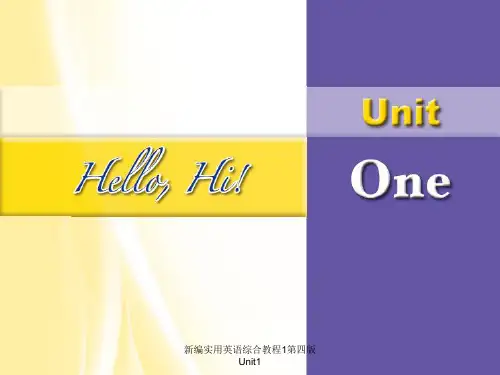
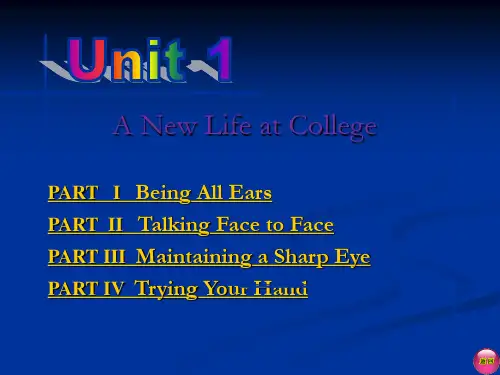
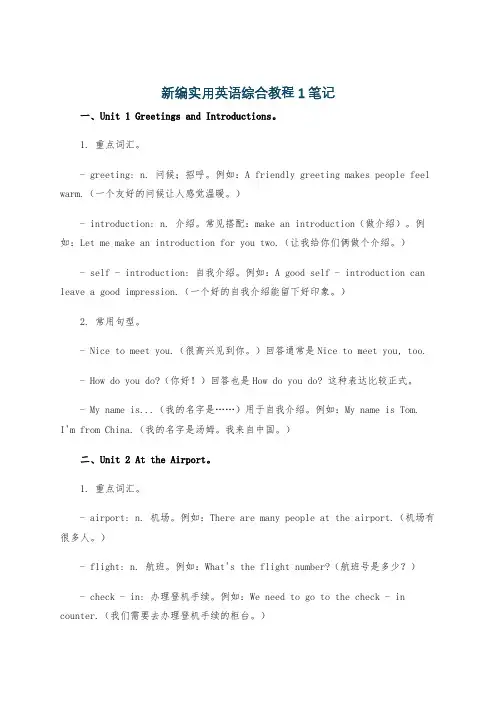
新编实用英语综合教程1笔记一、Unit 1 Greetings and Introductions。
1. 重点词汇。
- greeting: n. 问候;招呼。
例如:A friendly greeting makes people feel warm.(一个友好的问候让人感觉温暖。
)- introduction: n. 介绍。
常见搭配:make an introduction(做介绍)。
例如:Let me make an introduction for you two.(让我给你们俩做个介绍。
)- self - introduction: 自我介绍。
例如:A good self - introduction can leave a good impression.(一个好的自我介绍能留下好印象。
)2. 常用句型。
- Nice to meet you.(很高兴见到你。
)回答通常是Nice to meet you, too.- How do you do?(你好!)回答也是How do you do? 这种表达比较正式。
- My name is...(我的名字是……)用于自我介绍。
例如:My name is Tom.I'm from China.(我的名字是汤姆。
我来自中国。
)二、Unit 2 At the Airport。
1. 重点词汇。
- airport: n. 机场。
例如:There are many people at the airport.(机场有很多人。
)- flight: n. 航班。
例如:What's the flight number?(航班号是多少?)- check - in: 办理登机手续。
例如:We need to go to the check - in counter.(我们需要去办理登机手续的柜台。
)- boarding pass: 登机牌。
例如:Show your boarding pass before boarding.(登机前出示你的登机牌。
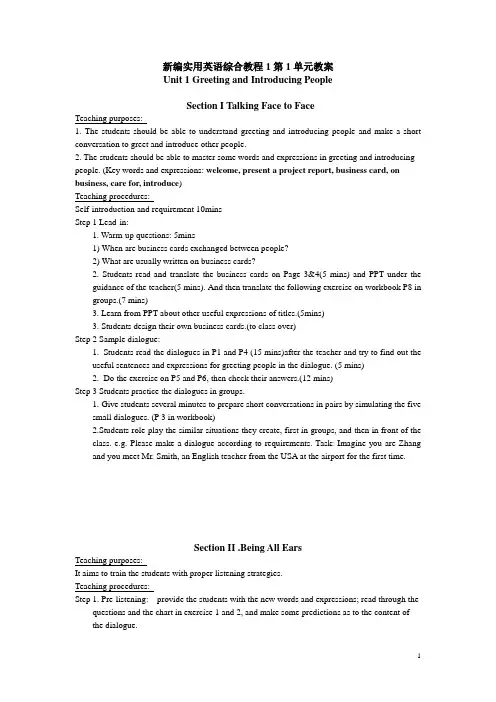
新编实用英语综合教程1第1单元教案Unit 1 Greeting and Introducing PeopleSection I Talking Face to FaceTeaching purposes:1. The students should be able to understand greeting and introducing people and make a short conversation to greet and introduce other people.2. The students should be able to master some words and expressions in greeting and introducing people. (Key words and expressions: welcome, present a project report, business card, on business, care for, introduce)Teaching procedures:Self-introduction and requirement 10minsStep 1 Lead-in:1. Warm-up questions: 5mins1) When are business cards exchanged between people?2) What are usually written on business cards?2. Students read and translate the business cards on Page 3&4(5 mins) and PPT under theguidance of the teacher(5 mins). And then translate the following exercise on workbook P8 in groups.(7 mins)3. Learn from PPT about other useful expressions of titles.(5mins)3. Students design their own business cards.(to class over)Step 2 Sample dialogue:1. Students read the dialogues in P1 and P4 (15 mins)after the teacher and try to find out theuseful sentences and expressions for greeting people in the dialogue. (5 mins)2. Do the exercise on P5 and P6, then check their answers.(12 mins)Step 3 Students practice the dialogues in groups.1.Give students several minutes to prepare short conversations in pairs by simulating the fivesmall dialogues. (P 3 in workbook)2.Students role-play the similar situations they create, first in groups, and then in front of theclass. e.g. Please make a dialogue according to requirements. Task: Imagine you are Zhang and you meet Mr. Smith, an English teacher from the USA at the airport for the first time.Section II .Being All EarsTeaching purposes:It aims to train the students with proper listening strategies.Teaching procedures:Step 1. Pre-listening: provide the students with the new words and expressions; read through the questions and the chart in exercise 1 and 2, and make some predictions as to the content of the dialogue.(Key words and expressions:1.Canada/The United States (of America) / the United Kingdom (of Great Britain andNorthern Ireland); England--Scotland--Welsh--Northern Ireland ;Britain;2.College3.Surprise surprise partyHis visit gave me a pleasant surprise. 他的来访使我感到惊喜。
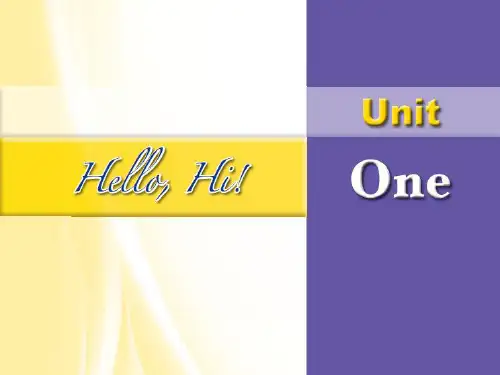
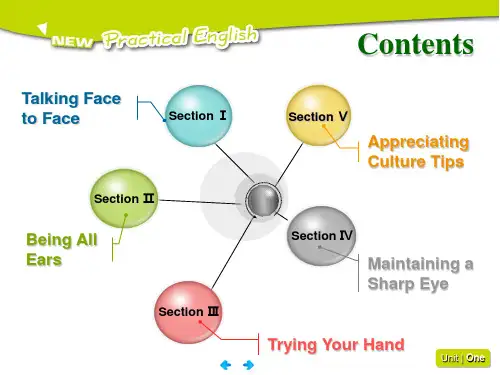


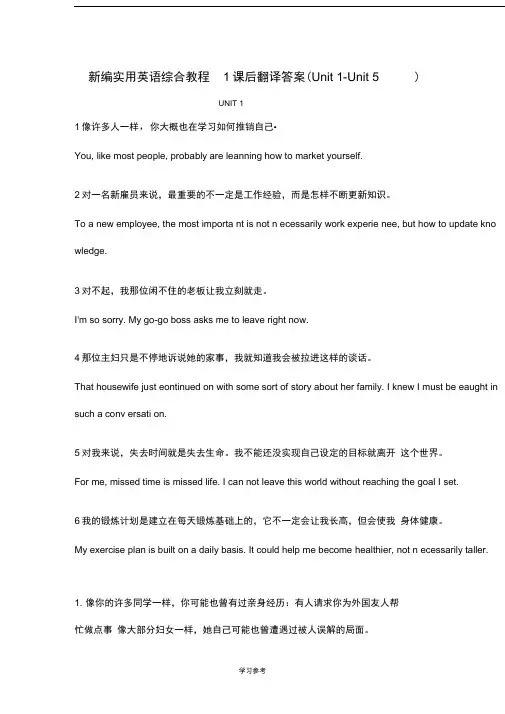
新编实用英语综合教程1课后翻译答案(Unit 1-Unit 5 )UNIT 11像许多人一样,你大概也在学习如何推销自己•You, like most people, probably are leanning how to market yourself.2对一名新雇员来说,最重要的不一定是工作经验,而是怎样不断更新知识。
To a new employee, the most importa nt is not n ecessarily work experie nee, but how to update kno wledge.3对不起,我那位闲不住的老板让我立刻就走。
I'm so sorry. My go-go boss asks me to leave right now.4那位主妇只是不停地诉说她的家事,我就知道我会被拉进这样的谈话。
That housewife just eontinued on with some sort of story about her family. I knew I must be eaught in such a conv ersati on.5对我来说,失去时间就是失去生命。
我不能还没实现自己设定的目标就离开这个世界。
For me, missed time is missed life. I can not leave this world without reaching the goal I set.6我的锻炼计划是建立在每天锻炼基础上的,它不一定会让我长高,但会使我身体健康。
My exercise plan is built on a daily basis. It could help me become healthier, not n ecessarily taller.1. 像你的许多同学一样,你可能也曾有过亲身经历:有人请求你为外国友人帮忙做点事像大部分妇女一样,她自己可能也曾遭遇过被人误解的局面。
新编实用英语综合教程1教案Lesson Plan for New Practical English Comprehensive Course 1。
Objective:Introduce students to the basic principles of English pronunciation and grammar.Develop students' reading, writing, speaking, and listening skills.Increase students' vocabulary and cultural awareness.Materials:Textbook: New Practical English Comprehensive Course 1。
Whiteboard or chart paper.Markers.Audio-visual aids (optional)。
Procedure:1. Warm-up (5 minutes)。
Greet students and lead them in a few simple icebreakers to get them talking in English.Examples:Good morning/afternoon, class.How are you today?What is your name?2. Introduction (10 minutes)。
Explain the objective of the lesson and the importanceof learning English.Provide a brief overview of the topics covered in the textbook.Ask students to share their prior knowledge of English or any experiences they have had with the language.3. Lesson Development (45 minutes)。
新编实用英语综合教程1第四版目录Unit 1-Unit2 (1)Unit 3-Unit4 (3)Unit 5-Unit6 (7)Unit 7-Unit8 (12)Unit 9-Unit10 (15)第一单元Put in use1.Robert Thank you pleasure Here is this is How do you do call me journey the hotel very kind2.Hi,are you Miss Mary Green?I’m Li hong from F oreign Languages School.How do you do,Miss Green?Nice to meet you.Did you have a good journey?Oh,yes.Let’s go to the hotel of our school.Everything is ready for you there.Well,Miss Green,here is my card.Please call me or email me if you need any help.3.Excuse me How do you do,Mr.Smith Welcome to our company you are the general manager Here is my card Thank you My email address isRead and Think1.It means a close and friendly relationship.2.They find these terms too formal.3.They want to show their friendliness.4.They want to know more about you so that they can begin a conversation with you.2 greet informal friendly formal wave perhaps leave3 use Mr.,Mrs.or Missuse first namescall me Sallyglad/happyinformal/friendlyd has left prefer personal accept means Speaking ofget to know acquainted with5.It is my impression that a typical English gentleman often takes an umbrella with him.To the students,the introduction to the cultural background is the best part of the book.When we talk with a foreign lady,in most cases we should not ask such personal questions as her age.Many young people prefer pop songs to old songs.They think pop singers are very cool.This beautiful and clean city has left a deep impression upon the foreign tourists.Professor L u Yang stood on the plane’s entrance and waved good-bye to us.6.We often express our happiness with a smile.She often speaks with a strong local accent.Similarly,Professor Green couldn’t bear laziness.Similarly,they don’t want to rely on others.Speaking of En glish,I’ve got to go to class.Speaking of business cards,I’ve got to print some more now.In China,family relationships are usually rather close.In my hometown,companies are usually rather small.These boys prefer football to basketball.I prefer Chinese food to Western food.Such an ending may be too hasty to me.Such weather may be too hot to the tourists.Read and Judge7.F F T F T T T F F T9.欢迎来到中华文化俱乐部。
《新编实用英语》(综合教程)UnitOneSection ⅠLesson PlanContent: Section ⅠTalking face to faceAim: The topic area of Taking Face to Face in this unit is to talk about greeting people and introducing with each other. The focus of functions is to Let Students get to know how to introduce and give personal informationImportant and difficult points:Procedure and methods:Step I. Leading-in1. Pre-class Work: Giving questions about the topic related to greeting and introduction2. Warming up for the new class3. Student Activity:1).Answering the questions presented by the teacher2). Making self-introductionStep II. Dialogue learning1. Explanation of the dialogue2. Giving sample dialogues based on the business card and passport3. Student Activity:1). Listening to the tape recording of the dialogues2).Pair work: Learning the dialogues by heart and Reading out the dialogues loudly in pairs.Step ⅢActing outAfter learning the five dialogues on the book1 Dividing the students into groups of four or five2 Offering more situations for students to make dialogue3 Summarizing this part4 Student Activities:1).Group discussion: Following the dialogue and making dialogues based on the given situations2). Comments on classmates’performanceStepⅣPutting in use1. Completing and checkingInstructions: Ask students to work in groups to complete by filling in the blanks on Page 4, and then check the answers in class.2. RespondingInstructions: Ask students to practice Exercise 2 on Page 4 of the textbook orally . Offer the situation in Chinese, and ask students to give the English version, the whole class works together. After each activity, check the answers and make comments promptly.Section ⅡLesson planSection ⅡListening Practice (for 90 minutes)Objectives/Learning Outcomes: Correct understanding of the listening material about greeting and introducing peopleTime Topic Teaching Method Student Activity AssessmentmethodAids20 minutesStep ⅠListeningand decodeListen andrespond1) Introduction of listeningcomprehension2) Explanation of the dialogueand comments1) Choosing the rightwords they hear2) Answering thequestions based onthe dialogue theyhear1) Questioning thestudents withsome words andphrases relatedwith the listeningmaterial2) Distinguishingsound -similarwords3) SimulatedperformanceTaperecording ofthedialogues15 minutes Step II.Listen andcompleteListen andjudge1) Introduction of somelistening skills: How to catchthe information you need2) Checking the answers1) Listening to thedialogue2) choosing the rightanswer for themultiple choiceexercises40 minutes Step ⅢListen andreadListen andmatch1).Explanation of the keywords2).Explanation of the listeningmaterial3).Checking the answers1) Filling in theblanks with thewords they hear2) Matching theinformation incolumn A withchoices in column B3) Writing out thegeneral idea of thepassage byContent: Section ⅡBeing All EarsAim: Make the students master more useful vocabulary phrases and sentences to express themselves in English .when they meet people and introduce with each other. Important and difficult points:1. Introduction:Listening comprehension is the receptive skill in the oral mode. When we speak of listening what we really mean is listening and understanding what we hear.In our first language, we have all the skills and background knowledge we need to understand what we hear, so we probably aren't even aware of how complex a process it is. Here we will briefly describe some of what is involved in learningto understand what we hear in a second language.2.Listening Situations:There are two kinds of listening situations in which we find ourselves:·Interactive·non-interactive.Interactive listening situations include face-to-face conversations and telephone calls, in which we are alternately listening and speaking, and in which we have a chance to ask for clarification, repetition, or slower speech from our conversation partner. Some non-interactive listening situations are listening to the radio, TV, films, lectures, orsermons. In such situations we usually don't have the opportunity to ask for clarification, slower speech or repetition.Listen for main ideas. The main ideas are the most important points the speaker wants to get across. They may be mentioned at the start or end of a talk, and repeated a number of times. Pay special attention to statements that begin with phrases such as "My point is..." or "The thing to remember is..."Give your full attention on the person who is speaking. Don't look out the window or at what else is going on in the room.Remember: time is on your side! Thoughts move about four times as fast as speech. With practice, while you are Listening you will also be able to think about what you are hearing, really understand it.Procedure and methods:Step ⅠListen and decode & Listen and respond1. Introduction of some listening skillsInstructions: Help students get to know how to distinguish sound-similar words.2. Explanation of the dialogue and commentsInstructions: In this part students must choose out the words they hear from the tape recording. After playing the tape twice, check their answers.3. RespondingInstructions: After listening to the tape for the third time, students are asked to answer the questions listed out in the textbook orally.Step II. Listen and complete & Listen and judge1. Completing after listeningInstructions: Ask students to fill in the blanks with the words they get from the tape recording after hearing it for twice.2. Judging after listeningInstructions: After students listen to the same dialogue for the third time, ask them to choose the correct answers to the given sentence.Step Ⅲ.Listen and read, Listen and match1. Explanation of the key wordsInstructions: Students are going to hear a passage with some blanks for them to fill in. Before playing the tape recording, explain some key words which will appear in it. Ask students to memorize these words.2. Explanation of the listening materialInstructions: After students finish the filling-in, explain some difficult language points in the passage.3. Matching after listeningInstructions: In this part a dialogue will be given to each of the students, after they listen to it, they are asked to match the information in Column A with the choices in Column B. Then check their answers.4. Answering questions after listening to the passage again.Instructions: In this part the students are asked to write out the general idea of the passage in one paragraph by answering some listed questions in the textbook.Step Ⅳ. Listen and conclude1. Exercises in the workbookInstructions: Give explanations to some new words in the workbook, and ask students to finish the exercises in it, then check their answers.Asking students to memorize the new words which appear in the textbookSection ⅢLesson PlanTime Topic TeachingMethodStudent ActivityAssessmentmethodAids5minutes Step ⅠLeading-in1) Revision2) Thebackgroundinformationabout thepassage3) Warming upfor the newpassages1) Reciting somesentences theyhave learned inthe previous class2).Makingself-introduction1) Oralquestioning2) Extractedexamples3)Simulatedperformance1) Mapsof theweatherforecast2)WordsCollectionaboutweather3)Taperecordingof thedialogues35 minutes Step IIComprehensionof the passage1) Textpresentation andlanguage points2) Asking somequestions aboutthe passage3) Summarizingthe passage1) Listening tothe tape recordingof the passage2) Answering thequestions3) Retelling thepassage in a fewword20 minutes Step ⅢFurther exercise1) Conductingstudents to finishthe exercises onpage 102) Explanation ofthe difficult partsof the exercise3) Checking the1) .Finishing theexercise on page102).Learning theusage of somekey wordsContent: Section ⅢReading Comprehension“Maintaining a Sharp Eye”. The students will first read the two useful passages of "The way Americans Greet" and "A little About Me". The teacher will interpret the new words and structures in detail. Finally help the students do the exercises.Aim: Master the key words and structures, and learn something about the way American great This will give them an idea of how to greet foreigners especially American and how to introduce themselves.Important and difficult pointsProcedure and methods:Step I. Leading in1. Revision of the previous lesson2. Warming up for the new passages3. Student Activity:1).Reciting some sentences they have learned in the previous class2).Making self-introductionStep II Comprehension of the passage1.Explanation of the new words and language points in the passageA. Important Words and PhrasesInstructions: Give some examples to explain the difficult words. Ask students to make sentences with the words they just learn.1). greet: v. say words of welcome to, express one‘s feelings on receiving sb. 问候,致意,打招呼e.g.: It is important for the students to learn how to greet people in English.The American professor greets his students with “Morning!”2).relationship:n. particular connection or relation; instance of being related 关系,联系e.g.: He is making efforts to develop a lasting relationship with Lizzy.3).wave: v. move one‘s hand to and fro, up and down (to give a greeting or say goodbye) 挥手致意,舞动e.g.: Jean waved goodbye to her Chinese friends,4). leave: v. go away from; fail or neglect to take/bring sth. 离开,出发;留下,遗忘e.g.: The beautiful city has left a deep impression upon our mind.5).impression: n. effect produced on the mind or feelings 印象e.g.: His speech made a strong impression upon the audience. 他的演说给听众留下了深刻的印象。
Unit oneGreeting and Introducing People Teaching Time: 5classesTeaching Goal s:By the end of this unit, students can :1.Greet and introduce people in Englishe the information in the cards to practice dialogue3.Clearly understand the way English people greet each other4.Describe a picture in simple EnglishKey Points:Everyday expressions the English people employ to greet and introduce people1st class: 50ms. Talking Face to FaceStep 1 . PresentationⅠ. Introducing myself according to my calling card: Good morning / afternoon, boys and girls! Nice to meet.Welcome to our college! My name is Yao fangfang . My English name is Yvonne. You can call me Mrs Yao or Yvonne as you like. From now on, we will be together through this term. I hope we can get well on with each other. I believe so! At last, I would like to give you my heartfelt wishes for you. May you have good study and campus life here.Ⅱ.Show them my calling card and explanation:first name/given name; (given at baptism)名last name/ family name:姓eg: Eliot T. SamuelⅢ.Give some useful expressions of greeting:A: Meeting people for the first timeHi / hello, nice to meet you. ( nice/glad/ honoured )Or:How do you do?How do you do?B: Meeting people againLong time no see/ how are you/ how have you been?It’s been quite a while, hasn’t it?How are you? Fine / nice/ pretty good/ not so bad/ just so so/ very well.That’s all right.How is your work / family?Ⅳ. Let students introduce themselves to me!Use the expression above.Step 2. Learn the samplesDialogue 1/ Dialogue 2.Ask students read them aloud and then practice them in pairs.Give some advice on how to learn English well.Four basic skills: Read, listening speaking and writing.Step 3. Act out ( homework)Look through and give the task to the students.Practice them in next class.Step 4 ..Homework: read aloud and learn by heart the “data bank”2nd class: Being All EarsKey language points1.leave a good impression upon sb.Your proper greeting leaves a good first impression upon me.2. rather3.each +V single4.that cool but inexperienced man5.I’ve got to6.speak of : mention7. nice to have met you.Step 1: Review check the homework. Act outStep 2. Listen to the dialogue and decode (twice)Step 3. Listen and respondListen to the dialogue again and answer the following questionsStep 4.Listen and completeNow listen to dialogue and complete the following sentences. Step 5. Listen and judge.Step 6.Read—listen—match and concludeMaterial: Introduction are important. P7Section Ⅲ( 3rd and 4th .5 classes) Maintaining a sharp eye Mr.: a courtesy title for any male adult not for styled sir”, “Dr”etc, used before the man’s family name or his position.b.Mrs.:“太太”a courtesy title for any married woman not styled“Lady”,“Dr.”etc.used before her husband’s .surname c.Ms.:“女士”a courtesy bile for a woman,whether she is married or not,followed by the family name.Miss:“小姐”A title to address an unmarried woman or a girl.It is followed by the family name.Miss can also be used as he title of address to an (esp.unknown)unmarrined woman. In this case,it is not followed by the name.l. Explanation of Difficult Sentences.1.(Title)The Way Americans GreetAnalysis:In this title,in which is omitted after the way> in…way means( to do sth ) by means of means a certain method美国人致意的方式Example:I think the way she runs her bookshop is worth studying.2. Speaking of time. I’ve got to run.A present participle clause used as an adverbial of cause/time. It means “ when it comes to time, I am reminded of…”说到时间,我得赶紧跑了。
3(Para.2)However,American introductions re usually rather simpleTranslation:然而美国式的介绍通常相当简单。
Example:Money is important.However.you cannot buy happiness with money.4.(Par.2)Glad to meet you.I’m Miller.But call me Paul.”很高兴见到你。
我是米勒,但叫我保罗好啦。
5. (Para.3)But Americans do sometimes ask such questions.Analysis:Do is used here to emphasize the following verb.“的的确确,真的”。
Translation:但是美国人有时确实问到诸如此类的问题。
6.(Para.3)In this way they can get better acquainted with you and —a topic for beginning a friendly conversation with you.Translation:这样他们便能更多地了解你,并由此为开端与你友好地侃一场。
Example:In this way you can improve your spoken English . Difficult and important words:1. Relationship n: instance of being related关系,联系eg:He is making efforts to develop a lasting relationship with Lizard.Both the two countries want to have friendly relationship between them.2.wave v.move one’s hand to and fro,up and down(to givea gf6eting or say goodbye)挥手致意,舞动eg:When Jane waved goodbye to her Chinese fiends,she could hardly hold back her tears.The policeman waved him nearerThe branches waved wildly in the wind.3. leave V.go away from;fail or neglect to离开,出发留下,遗忘eg:The beautiful city has a deep impression upon our mind.He is going to leave for Austrian next week 4.impression.effect reduced on the mind or feelings Elf$eg:The Kacher has made a deep impression on my mind with his devotion to everything5. prefer v.like better,would rather do更喜欢,宁愿eg:I prefer to have the meeting in the morning rather than in the afternoon.Which do you prefer,tea or coffee?Language points1. the Way Americans Greetthe way that…the way in whichthe way +zero articleeg: I do not like the way you did the thing/ you teach.2. greet sb: salute3. imply : suggest4. close and friendly5. similarly ←similar:大多数相同,但并非每个细节都相同.These pens are similar , but I like the blue one .same : 表示事物毫无改变或完全相同I haveused the same pen as before.6. prefer A to B: choose one thing rather anothereg : she prefers meat to vegetable.I prefer singing to dancing.7. however: conj, denoting a contract of this sentence to previousone.8. acquaint: make familiar with, get to knoweg: I have become acquainted with my new duties.Step 2. Read and thinkStep 3. Read completeStep 4. TranslateStep 5. SimulateHomework: Passage 2Check and explain next time.Section Ⅳ(6th class):Applied writingStep 1. Learn to write cards in English.Step 2. Read data bank by heart and try to remember them.Step 3. Sentence writingWrite through describing a pictureChinese New Year is also known as the Spring Festival, as it is the first day of the spring season according to the Chinese lunar calendar. This festival has been regarded as the most important traditional holiday for the Chinese people, whether they are home or abroad. Many special customs for the festival have beendeveloped. Paying a new year call is one of them. On this day, the new year greeting are given with a unique gesture. People will always bow to each other with their hands clasped while offering their best wishes for a happier and more prosperous new year. Section Ⅴ:Having some fun.Homework: 1. Exercise 5 on page 11.2.Try to write a short passage. Two topics to choose from:Why I come here?Whom I will be in three years?。